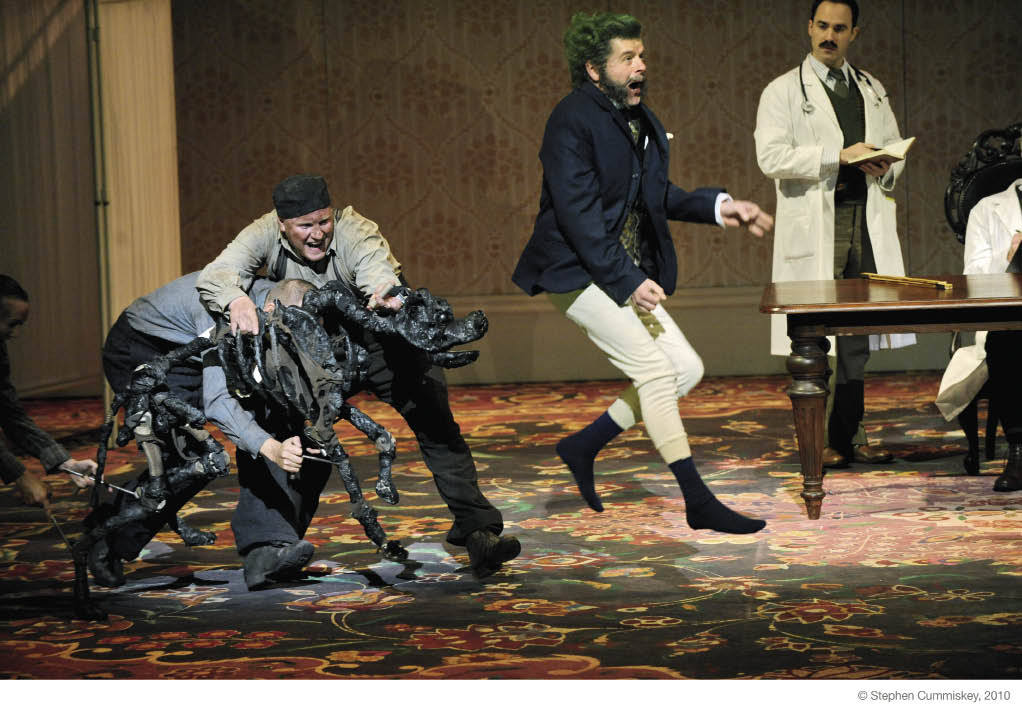Having been away, I only got to Alexander Raskatov’s opera A Dog’s Heart at its fifth performance by ENO, by which time everyone knew that it was brilliantly mounted, but not of much musical substance.
Having been away, I only got to Alexander Raskatov’s opera A Dog’s Heart at its fifth performance by ENO, by which time everyone knew that it was brilliantly mounted, but not of much musical substance. Actually, you could say the same for most of the new operas that ENO has mounted over the past decade, and from composers much better known than Raskatov. I’d be happy to volunteer a list.
For me a good deal of the unsatisfactoriness of A Dog’s Heart lies with Bulgakov’s novel, which is a scattershot satire on Soviet life, in particular on the social and genetic engineering which the early rulers of Soviet Russia hoped would lead to a happier society — hence the attempt in the novel and opera to graft a man’s testicles and pituitary gland on to a dog. When satire is most desperately needed — all the time, one might say — it needs to burn as much as it tickles, but Bulgakov, as anyone who has read his cult novel The Master and Margarita will know, had so exuberant an imagination that he couldn’t resist moving from satire to surrealist fantasy, and thereby losing focus.
If you don’t mind the opera having no real cynosure, this production by Simon McBurney will provide a lot of fun, some of it quite gruesome, and one scene which is hysterically funny. None of the enjoyment is either dependent on or much related to the musical side, which is not dull, in the way that minimalist operas are, but is vacuous, derivative and does nothing to justify the large forces involved. So far as I could tell, Garry Walker held things together with complete assurance, and some agreeably strange noises emerged from the pit.
Much more striking, though, and in some ways brilliant, were the sounds coming from the dog. This pathetic creature, a near-relation of Sorrow, Butterfly’s child in ENO’s to me loathsome production of Puccini’s masterpiece, was manufactured by the same team, and is based closely on ‘Dog’ by Giacometti. Like Sorrow, this animal is accompanied round the stage by several carers, and — unlike Sorrow — has two voices, one pleasant, emanating from Andrew Watts, the other unpleasant, thanks to Elena Vassilieva. The effect is dazzling, but more likely merely to amuse than to upset. When Sharik the Dog becomes Sharikov the Man, the puppet is replaced by Peter Hoare, who sings and acts with incredible giddy brilliance.
I can’t list other members of the cast, since it has so many, all of whom do a superb and difficult job. Yet the evening begins to seem far too long, and, as with so many things of this kind, you feel it’s only going on to get to the end of the plot. The evening did in fact go on for considerably longer than the press release and the programme promised, so that as always one left the Coliseum at the same time as all the other theatres were disgorging their patrons, and into a taxi-less snowy night. I earnestly suggest that whoever is responsible for ENO’s timings adds 20 minutes to the estimate in future, since that is, conservatively, how long the shows over-run, and if you don’t live in central London that matters.
Handel’s Alcina at the Barbican was a long evening, too, but began sensibly at 6.30. This masterly opera, perhaps my favourite in the composer’s vast output, was brought by Marc Minkowski and Les Musiciens du Louvre-Grenoble, a great band of players with a conductor who is flexible in his outlook, as increasingly in his repertoire, and who gets a rich, full sound from this very historically informed lot. His sympathetic accompanying gave the distinguished set of soloists every chance to act out their roles.
The Alcina was to have been Anja Harteros, but she was ill and Inga Kalna substituted, and most effectively. There’s no question that the sorceress Alcina gains ever more of Handel’s sympathy as the work progresses, until she becomes a proto-Marschallin, realising ruefully that her best days are past, and that however many spells she casts, heroic knights are going to escape and look for someone fresher. She vacillates between sadness and fury, and finally her deserting lover Ruggiero vanquishes her and she disappears, probably the best fate she can hope for.
The opera was mainly very finely performed indeed, but there was a disastrous piece of miscasting: Vesselina Kasarova, a singer I used to admire, has become a gross parody of herself, so that the role of Ruggiero became low camp, and the whole opera was devalued. She spat out absurd chesty sounds, slid into notes from way below, and acted to match. She got as much applause as she wanted, but it was ill judged, for this is a work where sympathies are distributed with great delicacy, but not here.






Comments